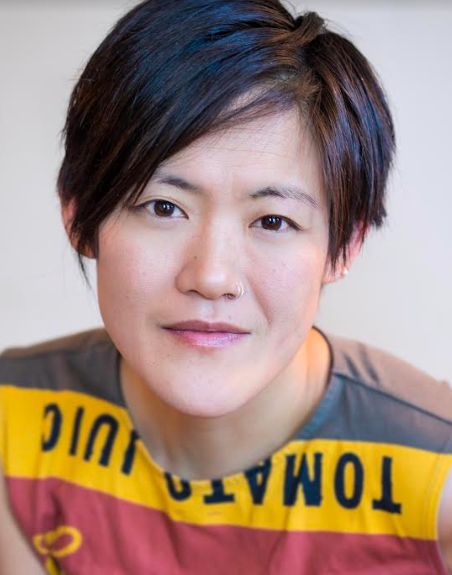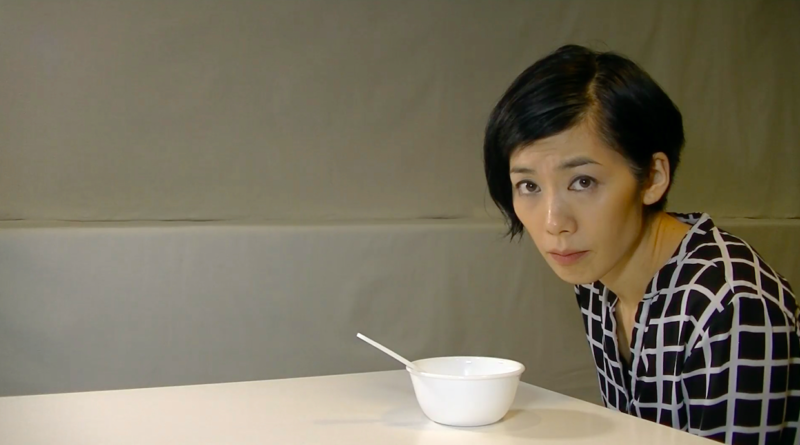INTERVIEW: Theater-maker Aya Ogawa reflects back, 10 years after Fukushima
Photo: Ludic Proxy: Fukushima, written and directed by Aya Ogawa, stars Saori Tsukada. Photo courtesy of © Ludic Proxy: Fukushima 2021 / Provided by Seven17 PR with permission.
In 2015, Aya Ogawa, a Brooklyn-based theater-maker, premiered her latest work, called Ludic Proxy, which was a reflection on the 2011 earthquake and tsunami disaster in Japan. Now, during these COVID-19 times, she is offering virtual audiences an updated and revamped version of the show, this time labeled Ludic Proxy: Fukushima. Performances will run online from New York City’s Japan Society.
The virtual show, according to press notes, utilizes real-time “audience polling” and features a story centered on two sisters who are navigating life in the aftermath of the 2011 Great East Japan Earthquake and nuclear disaster in Fukushima Prefecture. Maho is visiting her older sister Maki, who lives right outside the Fukushima nuclear evacuation zone. Throughout the performance, the audience is able to contribute to the drama by voting on Maho’s journey, providing her with direction as she moves through the narrative.
Ludic Proxy: Fukushima will be live-streamed March 6, 7 and 11, with Ogawa joining a post-performance Q&A on March 11, exactly 10 years after those scary incidents occurred. If those three dates don’t work out for audience members, the virtual presentation will be offered on demand until March 26.
Recently Hollywood Soapbox exchanged emails with Ogawa about Ludic Proxy: Fukushima, which features original stars Saori Tsukada and Yuki Kawahisa. Questions and answers have been slightly edited for style.
How is Ludic Proxy: Fukushima similar to your 2015’s Ludic Proxy?
The original production of Ludic Proxy is composed of three acts. Act 1: The Past is about a woman, who was evacuated from her hometown of Pripyat following the 1986 Chernobyl nuclear accident. Decades later, she happens to recognize Pripyat as the backdrop to a video game, and she navigates her way within the game to her childhood apartment, the home that she can never return to in reality. Act 3: The Future is set in the distant future when all of humanity has moved underground to a technology-saturated world to escape the toxic conditions of the Surface. A woman who searches for any surviving signs of life above ground suffers a series of losses that catapult her into a crisis, questioning her own mortality and unable to imagine a future for herself.
Ludic Proxy: Fukushima is a reimagining of the full play’s centerpiece, Act 2: The Present, and explores the personal ramifications of the earthquake and subsequent nuclear accident that took place in Japan in 2011.
How is real-time ‘audience polling’ incorporated into the theatrical piece?
The original play was conceived with video games as one of its dramaturgical foundations — so the game mechanics and audience interaction are embedded into the DNA of the play. (The script of Act 2 looks like a Choose Your Own Adventure Book.) That’s why I felt it would be natural and meaningful to translate this part of the play to an online experience. In the play, a woman, Maho, visits her older sister Maki who lives on the outskirts of the exclusion zone in Fukushima. Maho is also the audience’s avatar. Through a polling function, the audience will be given the opportunity throughout the play to choose what Maho says and does, thereby shaping the story through branching narratives.
How would you describe Maho as a character?
Maho is the younger sister to Maki, and as the younger of two siblings, she has shouldered fewer familial obligations. She has traveled more, studied abroad, and now lives in Tokyo, the urban center of Japan. In contrast, Maki has grown up, married and stayed in her more rural hometown, and has deep emotional ties to Fukushima.

This production will come around the 10-year anniversary of the earthquake and tsunami. What are your thoughts on this disaster 10 years later?
Though the fallout and recovery from the earthquake, tsunami and nuclear disaster are not covered in the media here very much anymore, they are active, live and ongoing. When the earthquake happened 10 years ago, I was deeply shaken to the core — as a person of Japanese heritage. There is a lot of psychic trauma that I carry as a Japanese person around nuclear energy because of the atomic bomb in World War II and what it represents to Japan — massive loss of life, suffering for generations, defeat, shame, toxicity. Both of my parents were children during that war, so I grew up hearing heartbreaking stories about that time. But they weren’t in Hiroshima or Nagasaki — and we don’t have family in Fukushima. What I’m getting at is that in any event, there are concentric rings of implication that ripple outward. I may be several steps away from someone who was directly affected by the Fukushima accident, for example, but I may be much closer to the event compared to someone who has no connection to Japan. My offering to the audience is to jump those concentric rings by giving them agency to exercise their imagination and live inside a character who is closer to the crisis event.
Your career has been spent ‘building bridges across cultures,’ as your biography puts it. Could you describe that motivation a little more? Why is that important for you?
I am Japanese. I am American. I am not Japanese. I am not American.
As an immigrant I will always house these contradictions. There is a lot of pain in those contradictions — but I also recognize that there is power and responsibility, if I choose to wield it. And every day, I do choose as an artist to use my voice and my relationships to bridge those linguistic and cultural rifts and be a conduit for others as well. Theater as an art form is about liveness and interaction — and my unique place in the theatre is about connecting across cultural boundaries as much as possible.
Do you feel this work takes on added resonance during a global pandemic?
Initially, when I was rereading the script in the late summer as we were considering this project, the connection I saw was that in the world today and in the world of this play, we are fighting against an invisible, silent, odorless, microscopic enemy. However, even more resonant are the differing belief systems around this common enemy as represented in two people, two sisters, and how close they can possibly get to understanding one another. In the U.S. today, we are living in a highly polarized climate where differing political beliefs (including beliefs around a virus) are tearing families, friends, and neighbors apart. This play today reads as an intimate experiment in empathy and reflects what some American families are going through right now.
By John Soltes / Publisher / John@HollywoodSoapbox.com
Ludic Proxy: Fukushima, written and directed by Aya Ogawa, will play virtually at the Japan Society, in association with PlayCo. Click here for more information.

